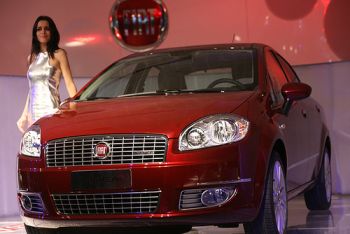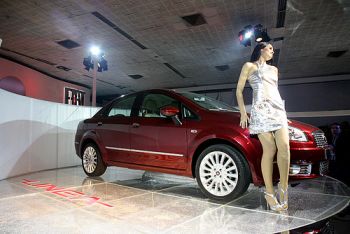
 |
|
Fiat's latest
model designed for global markets is the
Linea (above, on the occasion of its Indian
debut at January's New Delhi Auto Show). The
Linea project was developed and engineered
by Tofas in Turkey in conjunction with Fiat
Centro Stile. |
|
|
|
Fiat is
exploring the option of using its Ranjangaon plant near
Pune as a global base for some key models in the future.
This could even include its own low-cost car. In an
interview with DNA Money, Sergio Marchionne,
chief executive officer of the Fiat group, said the
Ranjangaon facility could be used for manufacture of
select models for the global market. “It eventually
boils down to standardisation of volumes. Perhaps our
own low-cost car for Europe could even be made in
India.”
The company had
put in a lot of resources, time and money in creating
Ranjangaon, he said. “This facility has the infrastructure
to build the Fiat brand in India. It can be an integral part
of the manufacturing footprint of Fiat worldwide and that is
a big issue for us,” Marchionne said.
Fiat has tied up
with Tata Motors in a 50:50 joint venture to manufacture
over 200,000 cars and powertrains in this plant. The Linea
and Grande Punto have been identified as the models for
India as part of a business plant which will see 70,000 Fiat
cars produced here till 2010. The balance will come from
Tata Motors.
However,
Marchionne did not think the relatively modest numbers would
be a limiting factor for the future. “It is a world-class
plant and we will find ways to increase capacity. When we
built our facility in Poland, it was designed for 250,000
units and the last time I saw it, it was in a position to
run over 600,000 units,” he said.
The Fiat CEO
reiterated that the low-cost car would clearly not carry the
company’s brand. “We need to be very careful about one thing
which is that the vehicle concerned cannot be a Fiat which
is a premium brand today in the segment it operates in. We
see some potential in Europe for this low-cost car though it
may not be a large part of the population,” he said.
According to him, there could be some fit with Tata Motors
for this project though this would be “more on the
architecture side”. Asked if it would take over from the
Nano platform, he replied that there were many options ahead
and this could be one of them.
Interestingly,
on the subject of small cars, Fiat had recently bought a 70%
stake in Serbia’s Zastava car company for $1 billion. This
facility makes the Punto and Astra for East European markets
with plans afoot to manufacture the Topolino on the same
platform as the Fiat 500. Marchionne said Zastava was “an
extension” of the manufacturing platform out of Poland. “We
need additional capacity to meet small car demand in Europe
especially for the A and B segments in the coming years and
this is where Zastava fits in for capacity expansion.
Ranjangaon will, likewise, be an integral part of that
global footprint,” he said.
On the Tata
alliance, there have been reports of Iveco, the truck arm of
Fiat, entering the picture too but the Fiat CEO said this
could wait for some time. “It may be premature to talk of
any deepening of the relationship on the Iveco side because
we need to wait till some of these markets mature and
require the level of technology. For the moment, the Indian
truck segment is not fully developed on the technology
front,” he said.
Also, the
overseas foray for Tata pick-ups could take a wee bit
longer. There were plans to roll out the company’s Sprint
from Fiat’s plant in Cordoba, Argentina but that has been
put on hold for the moment. “Both Tata Motors and Fiat are
not as convinced as what we were originally. The market does
not hold the kind of demand that we thought it would,”
Marchionne said.
Report courtesy
of DNA Money
|